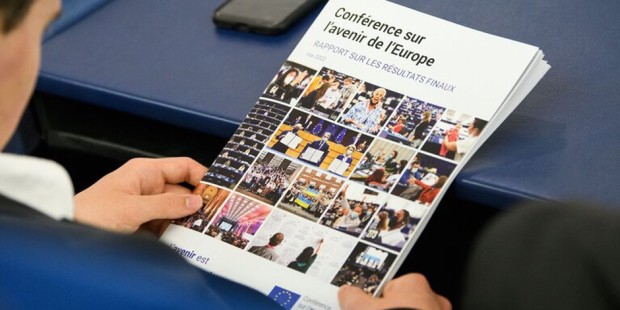Conference on the Future of Europe: Proposition 21
During an entire year, a panel of European citizens has worked in conjunction with the European institutions on the future of Europe. More than 300 propositions have emerged, including better decision-making within the Union. Focus.
 The climate change and the European energy dependence are a real concern to European citizens. Foto: Philippe STIRNWEISS / © European Union 2022 / Source: EP
The climate change and the European energy dependence are a real concern to European citizens. Foto: Philippe STIRNWEISS / © European Union 2022 / Source: EP
(Elsa Woeffler) – The demand of European citizens is clear: better decision-making and cohesion within the European Union. Proposition 21 of the report submitted to the European Parliament on Monday May 9, is clear: the citizens’ panel proposes that “the European Union should improve its capacity to take rapid and effective decisions in the framework of the Common Foreign and Security Policy, by speaking with one voice”. Five measures complete this proposition. This is not an unequivocal request, since at present, decision-making in the European Union is not made by a qualified majority vote, but by unanimity.
At present, decisions in the European Union are made by the “European institutional triangle”, which consists of the European Commission, the European Parliament and the Council of the European Union. And the unanimity rule is the one that applies systematically. Therefore, in order for a decision to be approved, the 27 Member States must give their approval or, at least, abstain to allow unanimity. They can also issue a veto, which gives them the power to block decisions. This voting system is usually applied to specific, but very important areas, such as the exercise of national sovereignty, i.e. foreign and defense policy, justice and home affairs, etc.
As a result, unanimous decision-making can be a source of deadlock. This is the case, for example, with the European embargo on Russian oil and gas, where some countries, such as Hungary, are blocking it. Or when voting on sanctions against member states, as in the case of Poland and Hungary, which are subject to two infringement procedures, and which can count on the right of veto of one or the other to escape. Taking decisions with a single voice, in order to impose oneself as a block, notably on the international scene, remains complicated. For the time being, a revision of the treaties is necessary. Without this revision, there will be no change in the voting system, unanimity will remain in place. But this revision is not well underway. Indeed, 13 Member States have already declared that they oppose a reform of the procedures.
In order to achieve this objective of uniformity and joint decision-making, the European Citizens’ Panel has devised five measures:
1. Ensuring that, in particular in the field of CFSP (common policy in the fields of foreign affairs and security), issues currently decided by unanimity, can be then decided by a qualified majority.
2. Basing security and defense policy cooperation on the recently approved strategic compass and using the European Peace Facility.
3. Strengthening the role of the High Representative to ensure that the EU speaks with one voice.
4. Agreeing on a strong vision and common strategy to consolidate the EU’s unity and decision-making capacity in order to prepare the Union for further enlargements.
5. By ratifying recently concluded trade agreements more quickly, without forgoing proper review and discussion.
During the next days, we will examine some of the most important propositions made in this report.

Kommentar hinterlassen